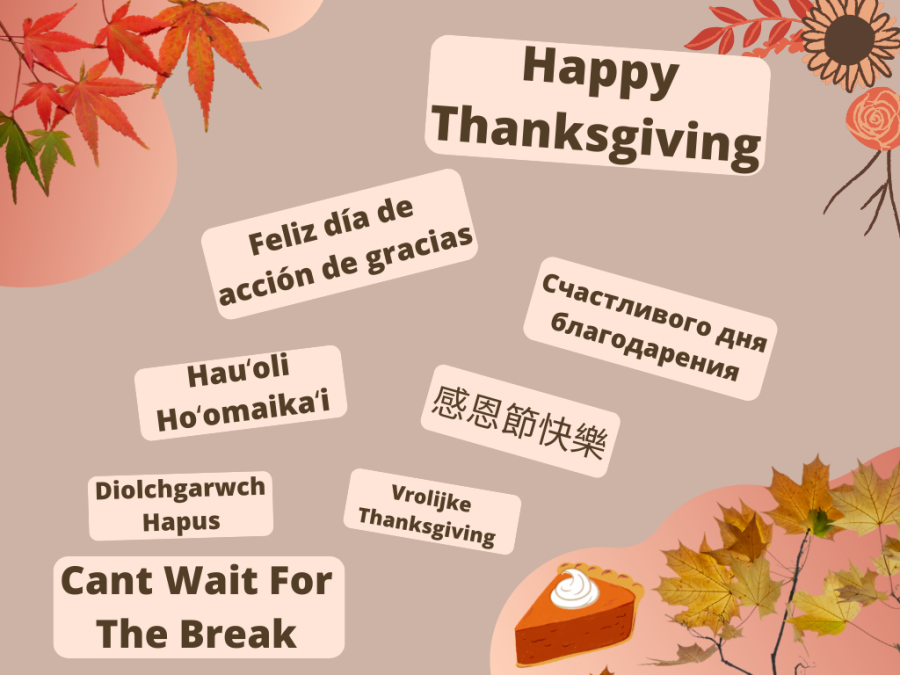Top 10 ways to say ‘I can’t wait for the break’
With Thanksgiving break approaching, reporters Yasmin Garada and Nanditha Nagavishnu compiled a list of ten different ways to say “I can’t wait for the break” in languages from across the world.
With Thanksgiving break right around the corner students anticipate it with their friends, but the same phrases over and over again about how they can’t wait for the break might get boring. We compiled a guide on how to say “I can’t wait for the break” in ten different languages from around the world. It doesn’t matter if you know some of these languages or not, you can use them anyways to foster Thanksgiving’s spirit of friendship and connection.
All phrases were verified by native speakers of the language.
Spanish
“No puedo esperar para el descanso”
Our very own Spanish I and II teacher Mrs. Quinones gets to celebrate both her birthday and the holiday over break. Her mom travels out from Florida and they will cook a lot together. We asked how she grew to celebrate Thanksgiving, and she said “since we moved to this country [from Cuba], it’s one of those holidays that we have adopted.”
Arabic
“مش قادرة استنى الاجازة” (mesh kadra astana el ijaza)
In Arab culture, Thanksgiving is all about gathering and cooking food, all while running on Arab time. Being “fashionably late” is always on the agenda, so if your Arab friend says the dinner starts at 6 p.m., make sure to come around 9 p.m. or you’ll be the only one there, and be ready to stay till the sun rises.
Hindi
“छुट्टी के लिए और इंतज़ार नहीं कर सकता” (chutti ke liye aur intezaar nahi kar sakta)
In Hindi, “छुट्टी” (chutti) refers to holidays, vacation, but can also mean “break” in the sense of “give me a break.” So the next time your Hindi-speaking friend is annoying you about all the places they will visit over the break, say this and see if they take the hint.
Chinese
“我等假期已经等不及了” (wǒ děng jià qí yǐjīng děng bùjíle)
You can specifically refer to winter break in Chinese, but not Thanksgiving. All of this list is generic enough for any holiday. To use this before winter break, replace “假期” (jià qí) with “寒假” (hánjià). For something more casual say “假期快来吧!” (jiàqī kuài lái ba) which translates to ‘holidays please come quick!”
French
“J’ai hâte d’être en vacances”
Our very own French teacher Madame Frenette plans to visit her daughter in Reighley, North Carolina over Thanksgiving break. She will drive by car (which takes more than 17 hours), enjoying a “little road trip.” We hope it’s not too tiring. Check out this article from The New Yorker to make your Thanksgiving dinner recipes a little French.
Korean
“방학까지 못 기다리겠어” (banghagkkaji mos gidaligess-eo)
Koreans celebrate an autumnal harvest festival similar to Thanksgiving called Chuseok, “추석” which falls around September. But Korean youth in America rarely observe it, according to a Frisco Liberty High School journalist. When on the topic of Thanksgiving break, ask about your friend’s traditional harvest festivals too.
Swahili
“Nimefurahiya kwa mapumziko”
The lingua franca of East Africa is Swahilli, so try this the next time you’re speaking to your East African friend. This translates more closely to “I’m glad for the break,” so replace “mapumziko,” which also means “break” in the sense of “rest,” with “sikukuu” if you want to specify “holidays.”
Russian
“я не могу дождаться каникул” (ya ne mah-goo dojzdatsya kanikool)
Rather than watching the football game and eating traditional Thanksgiving food, Russians celebrate the season making sure no one forgets where they came from. They often focus on Russian American food to incorporate the unique cuisine. So the next time you want to wish your Russian friend a happy thanksgiving, ask them what dishes they plan to serve.
Bengali
“আমি বিরতির জন্য অপেক্ষা করতে পারি না” (Āmi biratira jan’ya apēkṣā karatē pāri nā)
Since Bengalis are likely to be very pretty, remember this the next time you find yourself wanting to impress one. Once close enough to Thanksgiving break, you can add in “মা দূর্গা সহায়” (mā dūrgā sahāẏa), which means “thank god” or translates to “by the help of Goddess Durga.”
Telugu
“సెలవులు ఎప్పుడు వొస్తాడా అన్ని వెయిట్ చేస్తూన్నాను” (Selavulu eppuḍu vostāḍā anni wait cēstūnnānu)
Feel free to replace “సెలవులు” (selavulu) with English substitutes “holidays” or ‘Thanksgiving break’ since some native Telugu speakers might themselves not recognize the word. Also note that this phrase has a more tired, restless tone to it. Don’t say it with too much excitement or you may sound dumb.
Your donation will support the journalists of Hill Top Times and RH Media. Your contribution will help cover travel and registration costs needed for state and national conventions.

Nanditha is a senior and second-year staff member at Hill Top Times.

Yasmin Garada is a senior and is in her first year as a Hill Top Times Reporter. She was born in Virginia and moved to Texas last year. She is pursuing...








